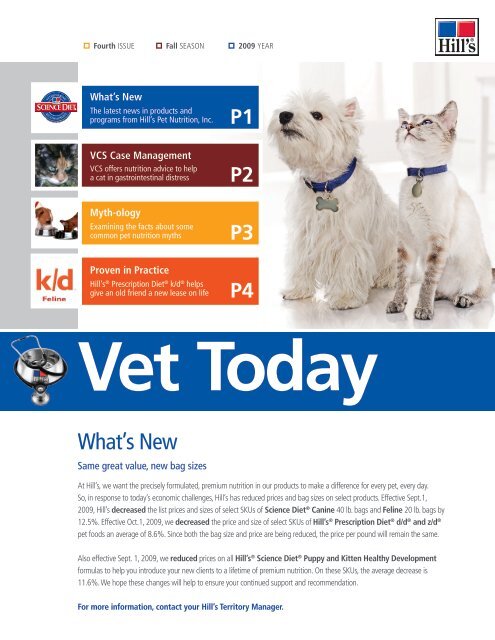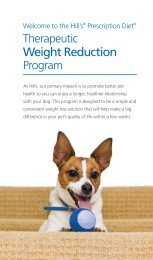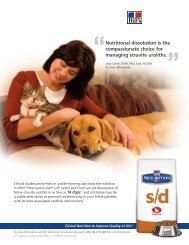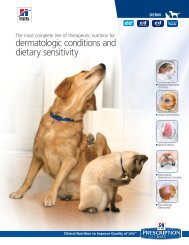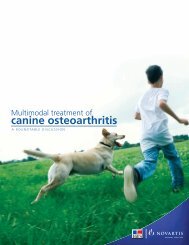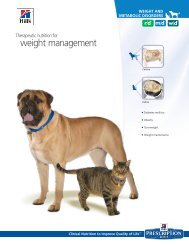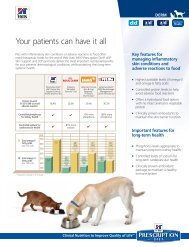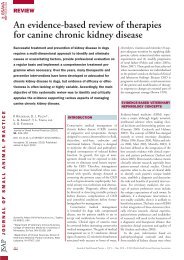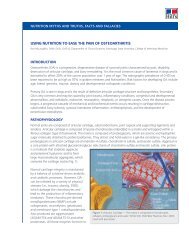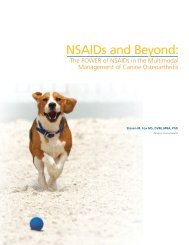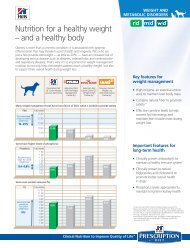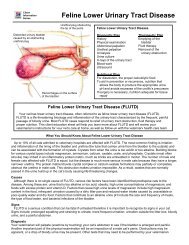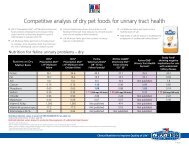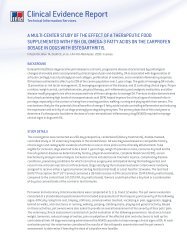What's New - HillsVet
What's New - HillsVet
What's New - HillsVet
You also want an ePaper? Increase the reach of your titles
YUMPU automatically turns print PDFs into web optimized ePapers that Google loves.
p Fourth ISSUE p Fall SEASON p 2009 YEAR<br />
What’s <strong>New</strong><br />
The latest news in products and<br />
programs from Hill’s Pet Nutrition, Inc.<br />
P1<br />
VCS Case Management<br />
VCS offers nutrition advice to help<br />
a cat in gastrointestinal distress<br />
P2<br />
Myth-ology<br />
Examining the facts about some<br />
common pet nutrition myths<br />
P3<br />
Proven in Practice<br />
Hill’s ® Prescription Diet ® k/d ® helps<br />
give an old friend a new lease on life<br />
P4<br />
What’s <strong>New</strong><br />
Same great value, new bag sizes<br />
At Hill’s, we want the precisely formulated, premium nutrition in our products to make a difference for every pet, every day.<br />
So, in response to today’s economic challenges, Hill’s has reduced prices and bag sizes on select products. Effective Sept.1,<br />
2009, Hill’s decreased the list prices and sizes of select SKUs of Science Diet ® Canine 40 lb. bags and Feline 20 lb. bags by<br />
12.5%. Effective Oct.1, 2009, we decreased the price and size of select SKUs of Hill’s ® Prescription Diet ® d/d ® and z/d ®<br />
pet foods an average of 8.6%. Since both the bag size and price are being reduced, the price per pound will remain the same.<br />
Also effective Sept. 1, 2009, we reduced prices on all Hill’s ® Science Diet ® Puppy and Kitten Healthy Development<br />
formulas to help you introduce your new clients to a lifetime of premium nutrition. On these SKUs, the average decrease is<br />
11.6%. We hope these changes will help to ensure your continued support and recommendation.<br />
For more information, contact your Hill’s Territory Manager.
What’s <strong>New</strong> (continued)<br />
Information about Hill’s ®<br />
Prescription Diet ® s/d ® Canine<br />
Dogs with a predisposition for, or a history<br />
of, pancreatitis are not candidates for<br />
nutritional management with Hill’s ®<br />
Prescription Diet ® s/d ® Canine. Breeds<br />
predisposed to pancreatitis include, but are not<br />
limited to, miniature schnauzer, Yorkshire terrier, Chihuahua, Jack<br />
Russell terrier, Japanese spaniel, Maltese, miniature poodle, sheltie<br />
and Lhasa Apso. Prescription Diet s/d aids in the dissolution of<br />
struvite uroliths and crystals, and is intended for short-term feeding<br />
only. Before feeding s/d Canine to dogs with other risk factors<br />
including hyperlipidemia, obesity, concurrent disease, those receiving<br />
administration of certain drugs such as corticosteroids, or over 7 years<br />
of age, call Hill’s Veterinary Consultation Service (VCS) at 1-800-548-<br />
VETS (8387) for a nutritional recommendation. Please note: Any<br />
patient being considered for treatment with s/d Canine should be<br />
evaluated as described in the complete product information, found<br />
on <strong>HillsVet</strong>.com and the Hill’s Key to Clinical Nutrition.<br />
Hill’s ® Science Diet ® launches<br />
new line of canine treats<br />
<strong>New</strong> Hill’s ® Science Diet ®<br />
Simple Essentials Treats are<br />
available in seven varieties to provide<br />
pet owners with a wide range of<br />
healthy options for rewarding their dogs.<br />
<strong>New</strong> varieties include:<br />
IMMUNITY SUPPORT<br />
Powerful antioxidants help support immunity<br />
TRAINING<br />
Perfect for training and rewarding<br />
SKIN & COAT ADULT JERKY STRIPS<br />
Vital fatty acids promote a healthy, shiny coat<br />
SKIN & COAT PUPPY & ADULT BISCUITS<br />
Vital fatty acids help prevent dry, flaky skin<br />
LIGHT<br />
Low calories help maintain healthy,<br />
trim body weight<br />
MOBILITY<br />
Naturally occurring glucosamine and<br />
chondroitin sulfate help support mobility<br />
ORAL CARE<br />
Patented fiber matrix helps freshen<br />
breath and clean teeth<br />
VCS Case Management<br />
Caller:<br />
Carolyn Levitz, DVM<br />
Thickwood Veterinary Clinic<br />
Fort McMurray, Alberta, Canada<br />
Patient:<br />
Pounce, a 9-year-old female,<br />
domestic cat<br />
Weight: 5.12 kg<br />
Presentation:<br />
Pounce suddenly developed<br />
megacolon. Defecation was<br />
difficult and extremely painful.<br />
Issue:<br />
What is the best nutrition for<br />
Pounce, who is suffering from severe<br />
gastrointestinal problems?<br />
Hill’s VCS Team Members:<br />
Mary DeBey, DVM, PhD, DACVM<br />
Vicky Ograin, MBA, RVT<br />
Advice:<br />
Dr. DeBey recommended Hill’s ®<br />
Prescription Diet ® g/d ® Feline<br />
canned for Pounce. With reduced<br />
sodium, high levels of omega-3<br />
fatty acids and added soluble<br />
fiber, g/d helped improve Pounce’s<br />
gastrointestinal health.<br />
Outcome:<br />
Within three weeks of starting Hill’s Prescription Diet g/d and cisapride,<br />
Pounce returned to normal litter box habits, and appeared to be pain<br />
free. With the continued help of g/d, Pounce is doing remarkably well.<br />
She has maintained her gastrointestinal health, and is back to being an<br />
active indoor cat.
Feeding iS belieVing <br />
Hill’s ® Prescription Diet ® and<br />
Hill’s ® Science Diet ® pet foods<br />
can make an incredible difference<br />
in your patients’ quality of life.<br />
See for yourself today.<br />
MyTH-ology<br />
Your clients need your help in separating myth from<br />
fact when it comes to choosing the right nutrition<br />
for their pets.<br />
Discover real-life results and share<br />
your own success story at<br />
Feedingisbelieving.com.<br />
MyTH:<br />
Cooking destroys<br />
nutrients<br />
FaCT:<br />
Cooking foods makes certain nutrients more digestible and<br />
it kills bacteria and parasites. The heat used to process pet<br />
foods may destroy some vitamins, but more vitamins are lost<br />
while the product sits on the shelf in the store. To make up for<br />
expected losses, manufacturers add extra vitamins to the food.<br />
Your FREE resource for case<br />
management and nutritional support<br />
MyTH:<br />
Preservatives<br />
cause cancer<br />
FaCT:<br />
There is no scientific evidence to support this claim. Preservatives<br />
in food protect fats from becoming rancid and inhibit the growth<br />
of mold. Actually, certain molds that grow on food can cause<br />
liver disease and cancer. Rancid fats (fats that have been oxidized<br />
when exposed to air) are also potentially toxic.<br />
VCS<br />
If you would like a second opinion on<br />
a challenging case or would like more<br />
information about Hill’s ® pet foods, call<br />
Hill’s Veterinary Consultation Service<br />
at 1-800-548-VETS (8387)<br />
or visit <strong>HillsVet</strong>.com.<br />
MyTH:<br />
Calcium and<br />
vitamin C<br />
supplements<br />
help prevent hip<br />
dysplasia<br />
FaCT:<br />
Extra calcium, protein and fat in pet food can predispose a<br />
pet to orthopedic conditions such as hip and elbow dysplasia.<br />
Large breed puppy foods contain restricted amounts of these<br />
nutrients to prevent bone diseases related to rapid growth.<br />
There is no scientific evidence that vitamin C supplementation<br />
will prevent hip dysplasia.
Proven in Practice<br />
Submitted by Gabrielle Radford, Veterinary Territory Manager<br />
A February 2009 checkup confirmed what Harley’s<br />
more normal behavior suggested: no decrease in<br />
kidney function in over a year and a half.<br />
He’s maintaining very well. He still<br />
has his six-month checkups and<br />
the news is always good — no<br />
decrease in kidney function. He’s<br />
turned back into the ‘old’ Bud<br />
Kitty, my good friend.<br />
When Alex Christensen’s good friend of 16 years, a male<br />
domestic shorthair named Harley Davidson (a.k.a. Bud Kitty),<br />
started losing weight and appeared listless, Alex suspected the worst.<br />
A trip to Iron Mountain Animal Hospital for an examination and blood<br />
work confirmed that the kidney problems Harley had been diagnosed<br />
with a year earlier had worsened. Harley’s veterinarian, Pauline Schroeder,<br />
DVM, recommended Hill’s ® Prescription Diet ® k/d ® Feline.<br />
To help diagnose kidney disease in the<br />
early stages, the team at Iron Mountain<br />
recommends regular geriatric kidney<br />
screening tests. Clients with pets at risk<br />
for the disease are sent home with a Hill’s kidney disease pet owner<br />
guide and a geriatric testing pamphlet, and are recommended to log<br />
on to HillsPet.com for more information.<br />
Dr. Schroeder explained that Harley was<br />
putting out more fluid than he was taking<br />
in, so we changed his food from 100% dry<br />
to a mix of k/d ® dry and k/d ® canned to<br />
help with hydration.<br />
Dr. Schroeder and the health care team at Iron Mountain also<br />
suggested that Alex put a water dish in every room in the house<br />
to provide extra hydration and bring Harley back every six<br />
months for a checkup. According to Dr. Schroeder, since Harley<br />
has been on k/d,<br />
he has put weight back on and is much<br />
‘brighter.’ He is active and vocal, and he<br />
interacts with his humans again.<br />
Iron Mountain Animal Hospital, 315 Kent Street, Iron Mountain, MI 49801<br />
www.ironmountainanimalhospital.com<br />
Contact your Hill’s Territory Manager to find out more information about the featured product.<br />
®/ Trademarks owned by Hill’s Pet Nutrition, Inc. ©2009 Hill’s Pet Nutrition, Inc.<br />
P-9715


